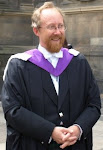That was the question that was being discussed yesterday morning.
It is quite amazing how the subject of religion has become so topical in the last few years that one of the first events of this year's Edinburgh International Festival was a debate about religion.
Specifically, the two debaters were called to address the motion that "The New Europe should prefer the New Atheism". The audience booked out the Stalls at the Usher Hall and the organisers had to open up the Grand Circle just a few days before the debate in order to accommodate all those who wanted to come and hear the debate. And it wasn't free - it cost £10 each, so it must have been a great financial success if nothing else.
The two debaters were journalist and author Christoper Hitchins, speaking in favour of the motion, and John Lennox, Fellow in Mathematics and Philosophy, and Chaplain at Green College, Oxford. Both men published books on the subject in 2007, Hitchins with "God is not Great: The Case against Religion" , and Lennox with "God's Undertaker: Has Science Buried God?". The debate was chaired by James Naughtie journalist and broadcaster.
My memory isn't good enough to record here details of the debate, but I enjoyed listening to the discussion and following the arguments. When reading a book you only get one side of the argument at a time, and here the interplay between two debaters was intriguing as they sought to justify their own positions and to counter the justifications of their opponent.
It seemed to me that Hitchins' argument was that a lot of conflict and abuse is carried out in the name of religion and therefore the world would be a better place if there was no religion, especially in politics. Lennox' counter-argument seemed to be that some of the worst massacres have taken place in atheistic regimes such as communist USSR and Cambodia.
However, neither debater took up the issue how it could be possible to enforce an adoption of atheism either in society as a whole, or only in politics and government, or indeed in any particular sphere.
Although religious groups seem to have less status in the UK these days, it does not seem likely in the near future that it will become illegal to hold a religious belief or to be a member of a religious organisation. At various times from the Roman Empire onwards there have been attempts to outlaw a particular belief, or to force people to hold a particular belief. None of these have achieved any lasting success. After all, it is too easy to say one thing and believe another.
It seems to me that those atheists who ardently oppose religious belief and practice are promoting exactly the intolerance that leads to discrimination and violence that they seek to remove by outlawing religion. Perhaps this is because atheism is really a faith position that believes there is no God without having any evidence to support their case.
The 18th century Scottish philosopher David Hume was cited by Hitchins in support of his argument. Hume said that there are only two forms of truth: one that can be proven by theoretical analysis, and the second that can be proven by experiment. And also that it takes a miracle for someone to believe in God. Yet Hume had no analysis or experimental evidence to justify his proposition. By his own criteria - his statement could not be truth!
Present day science has concluded that the physical, tangible, observable, universe is only 15% of what is really there. 85% of the matter and energy of the universe is comprised of Dark Energy and Dark Matter. Practically nothing is known of Dark Matter or Energy, yet scientists conclude that it is really there.
I agree with John Lennox when he states that he believes that there is a God, and that God interacts with people in our everyday lives, and that He became part of human life in the person of Jesus of Nazareth 2000 years ago. Much about God will remain forever mysterious, but for those with an open and enquiring mind, God is there to be found, and enjoyed, not just today, but forever.
Sunday, 10 August 2008
Subscribe to:
Post Comments (Atom)

No comments:
Post a Comment